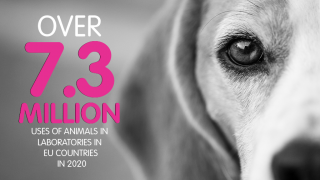
You can help us end animal testing in Europe
European Commission figures published this week show a decrease of 11% in the number of animals used in laboratories across the European Union in 2020.
While a decrease is welcome, the total of 7,331,263 uses is still far too many. Given the impact of the Covid-19 lockdowns, we had hoped to see a much bigger reduction which would also reflect a determined move away from reliance on animals.
Following the UK’s exit from the EU, most tests were carried out in Germany (1,897,640), France (1,643,787) and Spain (732,831).
Of these 7.3 million uses, 46% were considered by researchers to have caused moderate or severe suffering to the animals involved, an increase of 1% from 2019.
There were also significant increases in the uses of hamsters (18,016 uses, a 69% rise), horses (4,780 uses, up 74%) and cats (3,959 uses, up 11%).
Shockingly, there was a 12% increase in the use of the cruel and archaic ascites method of producing antibodies, to 41,916, despite it being a test which causes the most severe level of suffering and for which there is an accepted replacement non-animal method available.
Other tests with existing non-animal alternatives also saw increases in 2020, including a 28% rise in skin irritation and corrosion tests, to 4,070, and a 7% increase in eye irritation and corrosion tests, to 491. There is little justification for any of these tests still taking place, let alone to be increasing by such large amounts.
Tests required for regulatory purposes, to analyse the safety and effectiveness of products, amounted to 19% of the total number of tests. A further 39% were conducted for basic, curiosity-driven research, and 9% for breeding or the maintenance of genetically modified animals.
Last year, the European Commission committed to plan the full replacement of animal testing for managing the safety of chemicals in the European Union. Considering that a massive increase in the amount of regulatory animal testing taking place in Europe looks set under proposals relating to the Chemicals Strategy for Sustainability, planning a route to the full replacement of animal tests is more critical than ever.
Proposed changes to the REACH (Registration, Evaluation, Authorisation and Restriction of Chemicals) regulation have been delayed, giving the Commission further opportunity to revise this key regulation in line with the commitment to transition away from testing on animals and so prevent millions more animals from suffering and dying in experiments.
Our ‘End Animal Testing’ ECI, which was also supported by global beauty and personal care companies The Body Shop and Dove, became only the seventh to have successfully passed the threshold of one million verified signatures when in January it was confirmed that 1,217,916 people had demanded an end to the outdated and unreliable use of animals in cosmetics and chemicals tests.
In a poll carried out in 2020 for Cruelty Free Europe, nearly three quarters (72%) of adults in EU member states agreed that the EU should set binding targets and deadlines to phase out testing on animals.
Our Chief Executive, Michelle Thew, said: “The EU’s 2020 numbers show that far more needs to be done to end the cruel use of animals in research and testing. Despite the great progress made in the development of non-animal testing methods, and the clear desire of both the European Parliament and citizens of EU member states, these figures underline the urgent need for change.
“Europe’s lawmakers must surely appreciate the strength of feeling there is on this issue, as underlined by our European Citizens’ Initiative. The people of Europe have made the task for the European Commission clear: to create concrete plans to phase out animal experiments and end the suffering. We demand change in testing and research. It is high time for Europe to evolve past cruel and outdated animal testing.”
You can help us build on our successful ECI by emailing the European Commission to make sure that they listen to our call for an end to animal testing. Use our simple tool below to email the Commission. Together, we can help achieve a Europe in which no animals suffer in laboratories.
